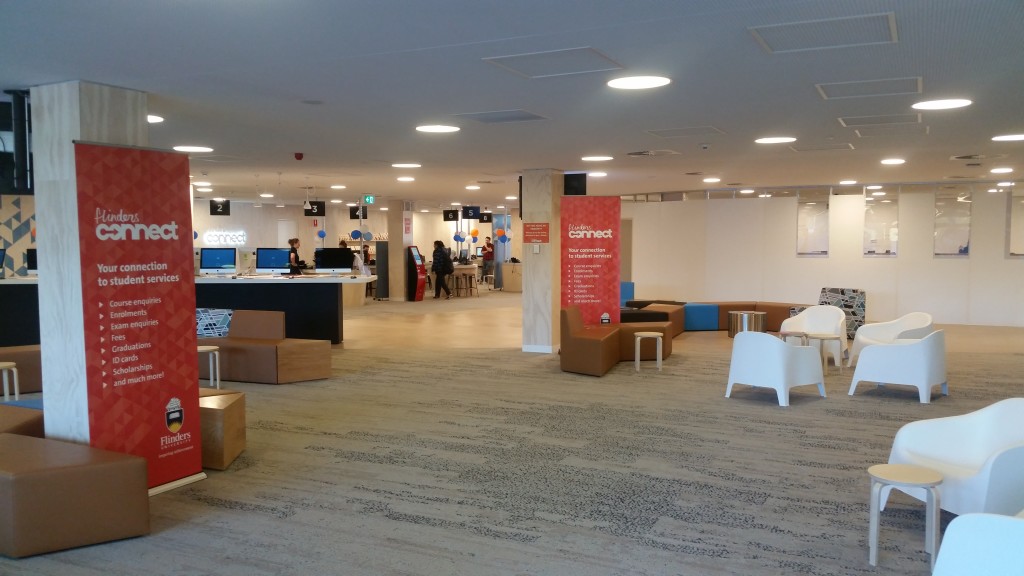 In the first two posts of this trilogy I discussed the background of the Flinders Connect student service centre and a strategy for driving the highest value from a combination of online self-service, service centre support, and more focused interactions. In this final post, I want to explore something which sets the University context apart from that of (say) a bank, a telco or a government department.
In the first two posts of this trilogy I discussed the background of the Flinders Connect student service centre and a strategy for driving the highest value from a combination of online self-service, service centre support, and more focused interactions. In this final post, I want to explore something which sets the University context apart from that of (say) a bank, a telco or a government department.
That something is one of the goals of of all Universities: to develop strong graduate capabilities within students as a fundamental outcome of attending University.
I’ve linked to our graduate qualities, but I could link to the graduate qualities/attributes/capabilities of pretty much any Australian University and the story would remain largely unchanged – we want, and future employers expect, students to leave University with the ability to problem solve, to proactively seek out information, to be able to communicate well, to be confident users of technology – the lists go on. Whilst not specifically part of the mandate of a student service centre like Flinders Connect to support the development of these skills, there is an opportunity to align the way in which we deliver services to a model which helps build these graduate capabilities within our students. It could be argued that it is an opportunity too good to ignore.
This is in stark contrast to corporate service providers in particular (think of any telco or bank), where the end goal of the business is not to foster the development of the intellectual capacity of the individual – in fact the more cynical might argue that the exact opposite is true for some corporate providers! Instead, the focus would be on minimising cost while still providing enough service to maintain customer satisfaction, and hence brand loyalty. Even government departments may have an underlying goal of ensuring the public is aware of the services on offer, but few would have the education of their clientele anywhere near the pinnacle of their vision statements. No, the Higher Education context is a special one, and one where there is an opportunity for service centres to work in partnership with academic areas to deliver on the core business of the University in fostering capability within its customers.
The crossover between student services and learning theory
So how could the development of graduate capabilities in students be more purposely driven by student service centres? Some aspects could be borrowed from the pedagogical side of the family – for those familiar with John Biggs’ work on Constructive Alignment (‘Academic Susan’ and ‘non Academic Robert), there are very possibly some parallels between the creation of learning activities and the achievement of learning outcomes with the construction of support materials and processes for students attempting to navigate administrative tasks. In a model where support databases and FAQs were co-created by students and staff then some of the theories of both social constructivism and constructionism are applicable. Support materials for students could also probably benefit from the application of other learning design principles like Gagne’s nine events (among others) as part of their development. Sadly my knowledge in these areas isn’t deep enough to make all that much in the way of meaningful insight, but I’d love to hear the thoughts of my more learned colleagues on this front.
These are all lofty ideals, and while they are not without merit, there is one important input missing from all of the above – the student voice. This in itself presents a fascinating conundrum – would students choose to have a student services model that is consciously designed to make them develop their graduate capabilities, or would it be seen as putting up unnecessary hurdles on an already challenging track? Do we give students the services in the form they want, or in the form they possibly need to further develop their graduate capabilities? And how much of it should be their choice rather than the University’s? This is possibly the biggest philosophical question for the University student service centre, and for the University as a whole: is the service centre there purely to deliver quality services at a low cost, or does it exist as part of the broader learning and development environment for its customers?
While none of these questions have obvious answers, there is value in their consideration as I look ahead to the next year or two in Flinders Connect and work out what value it can deliver to students, both in their immediate service requirements, but also as part of the University’s broader commitment to developing students with the necessary skills to prosper in their careers.
